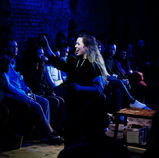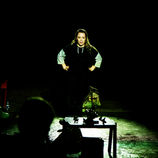CASEY JAY ANDREWS
Writer + Designer
WRITING PORTFOLIO
THE WILD UNFEELING WORLD



★★★★ The Independent ★★★★ The Scotsman ★★★★★ Fringe Biscuit ★★★★★ Within Her Words ★★★★★ Butterwort Art
★★★★½ Eventalaide ★★★★½ Adelaide Theatre Guide ★★★★ British Theatre Guide ★★★★ The Advertiser ★★★★ The Wee review
★★★★ ClothesLine ★★★★ Broadway Baby ★★★★ Ask The Ushers ★★★★ Great Scott ★★★★ Kryztoff Raw ★★★★ Glam Adelaide
★★★★ Mervyn Stutter's Pick of the Fringe

AWARDS
Winner: Best Theatre Award (Adelaide Fringe BankSA Weekly Awards, 2020)
Nominated: Origins Award (VAULT Festival, 2020)
FEATURES:
The Guardian's “Top Shows of the 2019 Edinburgh Festival Fringe”
The Guardian’s “Pick of VAULT Festival” 2020
SELL OUT SHOW Edinburgh Festival Fringe 2019
THE WILD UNFEELING WORLD is a tender, furious and fragile reimagining of Moby Dick.
A surreal and lyrical suburban fable of bad luck, reckless choices and irrational hope that takes place on the day a Juvenile Female Bottlenose Whale swam up the Thames and into the centre of London.
Herman Melville’s iconic novel is reinvented on the riverbanks of the city and follows a woman on the brink of self-destruction. We meet Dylan on the roof-top of a multi-storey car park in Hounslow, directly in the flight path of Heathrow Airport; it's 4.30 in the morning, she's watching the first flights of the day rumble into the crisp dawn. This story is her seemingly futile quest for joy and calm in a chaotic world.
I wanted to write about the damage we are capable of doing when we cast ourselves as the villain in our own narrative, and how reaching for help in a crisis is not necessarily a straightforward task when you’re in the centre of the storm. This is a play about the overwhelming and irrational reality of a breakdown. I particularly wanted to explore how trauma affects how we process memories, and the flexibility of perception vs fact.
I began writing THE WILD UNFEELING WORLD to explore the themes of shame and guilt in an increasingly judgemental moral landscape. I started with the age old adage: "there are shitty people in the world, maybe I’m one of them?". I wanted to write about what we do when we begin to turn on ourselves. How do we ask for help when we believe our problems are messy and unpalatable, or when we believe we have become a burden? What if we lose the capacity to make a rational assessment of our reality altogether? It is an urgent problem and it doesn't have easy answers, but what we do know is that navigating a chaotic mind can be an obstacle for people seeking out the support they need.
So why Moby Dick? The depths of symbolism in Moby Dick are endless and impossible to cover in 60 minutes, a stupid idea you might say, and you'd be right! If one thing is certain it’s that this is not just a story about hunting a whale. There are infinite readings to be mined from the novel, but I find it fascinating and beautifully eloquent as an exploration of Herman Melville’s experience of a life battling with his own mental health challenges, and his attempt to unpick the human psyche. Experts have suggested that Melville was likely to have lived with bipolar. The book can be read as a rich exploration of what it is to crash through life on the soaring highs and dark unthinkable lows of an unquiet mind.
Secondly, the whale in that novel is no villain. Though Moby Dick destroys them, it is Ahab who wreaks the ultimate disastrous fate upon himself and his crew: he is relentless in his quest to exact revenge, he sees the world in black and white and refuses to bend from his binary view of good vs evil. I wanted to look at the pitfalls of placing blame after we have been hurt, and where the root of self-destructive and obsessive tendencies stem from.
This suburban reinvention of the tale is also a personal little love letter to London: the rumble of the flight path I grew up under, the beauty in the dated concrete landscape of the suburbs, and the riverbank which brings moments of calm in the chaos.
Life is full of surreal unexpected stories. Sometimes whales swim into the city centre. Roll with it.
Written by Casey Jay Andrews
Directed by Steve McCourt
Music by George Jennings
Special thanks to the Thames Whale
“Funny, and sad, and deeply human, this stands out for the elegance of its writing and the depth of its emotional journey… It’s a story about seeing the world turn against you and being honest enough to acknowledge that it’s partly your fault. It’s about the danger of seeing the world in black and white, the importance of small acts of kindness, and how sometimes it’s okay to admit that some things are just too big to wrestle with” (The Scotsman)














